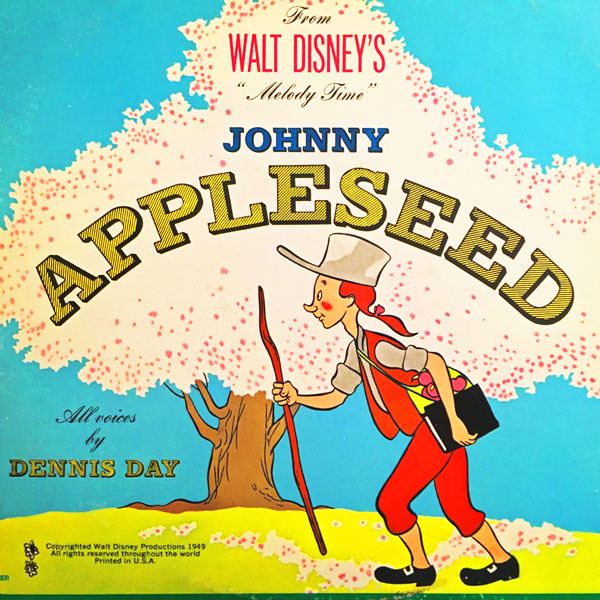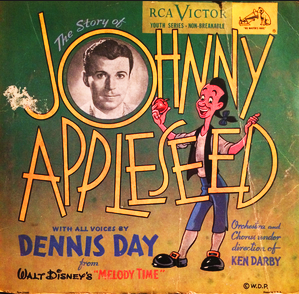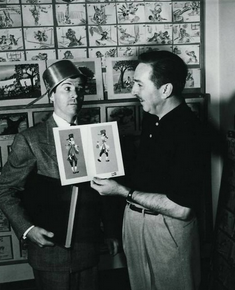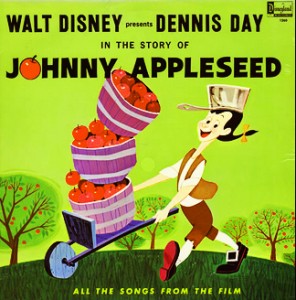“Johnny Appleseed,” the third segment of Disney’s 1948 feature, Melody Time, was recorded by RCA and Disneyland Records with similar scripts but different production values.

From Walt Disney’s MELODY TIME
JOHNNY APPLESEED
All Voices by Dennis Day
RCA Records Little Nipper Series Y-368 (Three 10” 78 RPM Records)
RCA Records Little Nipper Series 45-5213/14/15-368 (Three 7” 45 RPM Records)
LP Reissue: RCA Camden CAL-1048 (with “Pecos Bill”)
Adapted for Records by Winston Hibler. Musical Director: Ken Darby. Running Time: 19 minutes.
Voices: Dennis Day (The Old Settler, Johnny Appleseed, Owl, Deer, Hare, Panther, Bear, Johnny’s Angel); The Ken Darby Singers.
Songs: “The World is Good to Me,” “Pioneer Song,” “The Apple Song,” “Blessed Are the Peacemakers” by Kim Gannon, Walter Kent.
 Between rebroadcasts on network, cable and syndicated TV, video releases and 16mm film rental, Disney got a lot of mileage out of Johnny Appleseed. The character is well known in folklore yet is the subject of few film adaptations, so the Disney one is usually the most top of mind. While it’s never been a critical darling, the animated segment is most notable for its Mary Blair design, perfectly suited to the folk art theme.
Between rebroadcasts on network, cable and syndicated TV, video releases and 16mm film rental, Disney got a lot of mileage out of Johnny Appleseed. The character is well known in folklore yet is the subject of few film adaptations, so the Disney one is usually the most top of mind. While it’s never been a critical darling, the animated segment is most notable for its Mary Blair design, perfectly suited to the folk art theme.
Dennis Day is usually overlooked, not only for the versatile voice work he does on the film and both audio versions, but also for his considerable talent and durable career. He came to fame as a little-known tenor on Jack Benny’s long-running radio program (a work of comedic art that everyone should enjoy during his or her lifetime). In his great wisdom, Benny immediately recognized the raw talent in the relatively inexperienced Day (born Eugene McNulty) and gradually gave him more time on the show.
 Day rose to the challenge and developed his on-show character into a Gracie Allen/Woody Boyd type who lived in a ditzy world of non sequitur innocence. His specialty with Benny was the layered joke—Benny would ask him something, Day would reply with a silly answer, Benny would try to clarify, Day would zing in the punch line—then, after the big laugh, top it with a funnier line. Not only did he eventually do a Benny show in which he switched places with Jack in a dream, he was spun off into his own radio sitcom, A Day in the Life of Dennis Day (costarring Dink Trout, the King of Hearts in Disney’s Alice in Wonderland).
Day rose to the challenge and developed his on-show character into a Gracie Allen/Woody Boyd type who lived in a ditzy world of non sequitur innocence. His specialty with Benny was the layered joke—Benny would ask him something, Day would reply with a silly answer, Benny would try to clarify, Day would zing in the punch line—then, after the big laugh, top it with a funnier line. Not only did he eventually do a Benny show in which he switched places with Jack in a dream, he was spun off into his own radio sitcom, A Day in the Life of Dennis Day (costarring Dink Trout, the King of Hearts in Disney’s Alice in Wonderland).
These vocal talents were cemented into Disney permanence by playing three roles in Johnny Appleseed, distinct enough to make one forget they’re the same person (he even voices the animals on the record versions). And of course, his powerful tenor soars in songs written specifically for his wide range (tenors were especially popular in early radio and recording).
In the film, Johnny goes directly from befriending the animals to reaching the settlers, singing another rendition of “The Lord is Good To Me.” On both records—but not in the film–Johnny sings “Every Seed I Sow” and encounters Native Americans who seem fierce but become his friends. Johnny’s endearing nature—and the heart of the story is to see all people and animals as peaceful allies, but the narration uses some uncomfortable terminology that was common in popular culture 50+ years ago.
GIVE A LITTLE LISTEN
Johnny Appleseed Opening Excerpts
A comparative sample of the RCA and Disneyland albums, exemplifying how similar they were and the impact that 16 years of change in the recording industry can make to children’s record budgets.
Walt Disney Presents
DENNIS DAY in the Story Of
JOHNNY APPLESEED
Disneyland Records DQ-1260 (12” 33 1/3 RPM with Book / 1964)
Disneyland Storyteller ST-3996 (12” 33 1/3 RPM with Book / 1971)
Executive Producer: Jimmy Johnson. Producer: Camarata. Running Time: 21 minutes.
Voices: Dennis Day (The Old Settler, Johnny Appleseed, Owl, Deer, Hare, Panther, Bear, Johnny’s Angel); The Jack Halloran Singers.
Songs: “The World is Good to Me,” Pioneer Song,” “The Apple Song,” “Every Seed I Sow,” “Blessed Are the Peacemakers” by Kim Gannon, Walter Kent.
 The Disneyland Records version of Johnny Appleseed was recorded almost two decades after Melody Time was released to theaters, but Day’s voice never changed, even far into the ‘80s when he was doing Kellogg’s Corn Flakes commercials.
The Disneyland Records version of Johnny Appleseed was recorded almost two decades after Melody Time was released to theaters, but Day’s voice never changed, even far into the ‘80s when he was doing Kellogg’s Corn Flakes commercials.
Since longtime Disney staffer Winston Hibler adapted the RCA script, it’s likely that it was in the studio library for access by Disneyland Records, as this album is a word-for-word remake of the earlier one.
The major difference is the size of the orchestra. By the ‘60s, the cost of a full orchestra was prohibitive for a low-cost children’s record. That said, this album is remarkably well-orchestrated despite the budgetary limitations and the choral work, also reduced, is superb.
Johnny Appleseed was also released as a little LP book and record set narrated by Robie Lester with three songs and the art that appeared in the Storyteller album along with additional drawings. Dennis Day also recorded a handful of albums for Pickwick’s Cricket Records, including a completely different (and far more modestly budgeted) musical version of Johnny Appleseed a few years before he made the Disneyland LP.
GIVE A LITTLE LISTEN
“The Lord is Good to Me”
The brevity of Disney’s Johnny Appleseed sequence lent itself to very short songs. This one is Johnny’s theme, sung at the beginning, middle and end of the cartoon. The version here is from the 1964 Disneyland album, in a stereo version that for some reason, was never used anywhere except on Disney’s 1972 Storyteller album Stories from The Mouse Factory, which we explored here.


 GREG EHRBAR is a freelance writer/producer for television, advertising, books, theme parks and stage. Greg has worked on content for such studios as Disney, Warner and Universal, with some of Hollywood’s biggest stars. His numerous books include Mouse Tracks: The Story of Walt Disney Records (with Tim Hollis). Visit
GREG EHRBAR is a freelance writer/producer for television, advertising, books, theme parks and stage. Greg has worked on content for such studios as Disney, Warner and Universal, with some of Hollywood’s biggest stars. His numerous books include Mouse Tracks: The Story of Walt Disney Records (with Tim Hollis). Visit 






















































Makes you wonder why the first three covers of Johnny Appleseed show him wearing shoes and the final cover showing him barefooted?
Dennis Day also starred in Rankin Bass’s Frosty’s Winter Wonderland (in my opinion the TRUE sequel to Frosty the Snowman – and not Frosty Returns) and the animated version of The Stingiest Man In Town.
Who knows, unless they simply wanted to use his look from when he first appears in the story than from later on. In the film itself, Johnny doesn’t appear to go barefoot until just after he started on his trek through the wilderness and comes across an area to plant and befriends the animals there. It’s never specifically implied when he lost his shoes/stockings during that time, it just happens.
You said it
I’ve always enjoyed Dennis Day’s work on Johnny Appleseed. Thanks for the additional information and the samples. More to hunt for now!
I found my copy of the ’64 Disneyland edition at a thrift shop just before it was forced to close for non-payment. Their stuff is STILL inside the place and it’s been a few years since they shut down, to this day I wonder when are they going to chuck it out?
I guess this bit of musical animation will always be the rarest of all Disney features/featurettes. As the classic stuff becomes more and more rare, it is nice to see the postings of all the background here. Thanks for this.
Hi, Mr. Ehrbar!
I have had (almost since it came out in 1953) another issue of the RCA version. This was a 45 EP. Since the original was on 3 discs, the EP had to be edited down a little to fit the 15-minutes-or-so limitations of the EP format. The issue, in the special children’s EP series, was catalogue number EYA-6.
You’re right! Dennis’s talents as singer and actor were awesome! One of my favorites is where Dennis has a heartbreaking encounter with the IRS and later complains to Jack about it:
Dennis: They took everything–my house, my car, my arch supports….
Jack: Your ARCH supports!?!
Dennis: Yeah! That REALLY left me flat!
Hope you won’t mind a small correction:
In your post, whenever you mention “The Lord Is Good To Me” in the text, you get it right. But in the two places where the title is shown as part of a list of all of the songs, you have it as “The *World* Is Good To Me.”
I also take note of your reference to the reduced budgets for later children’s records. It is partly because of that that I date my own choice of The Golden Age of Children’s Records as about 1945-1959 in terms of output, originality, and monetary production values.